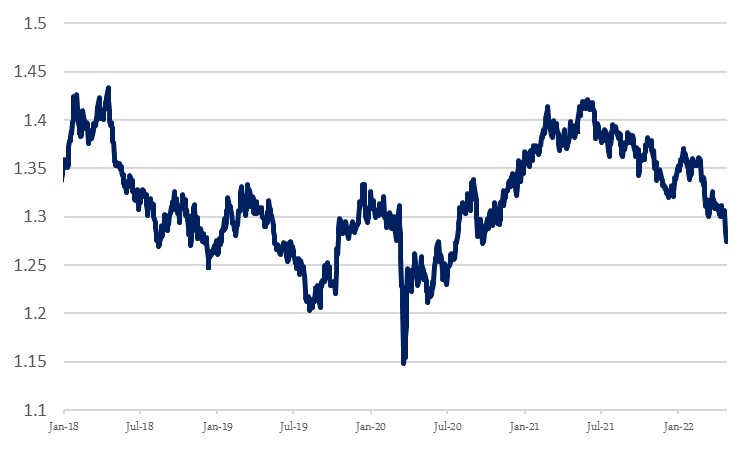
The IMF recently made significant downgrades to its headline macroeconomic forecasts, citing the deleterious effects on growth of the mounting cost-of-living crisis. With the war in Ukraine showing no signs of de-escalation, and China still following a zero-Covid policy, upward inflationary pressures will remain to the fore, while governments are less willing to implement the kind of extraordinary spending support measures seen through the pandemic. This will increasingly lead to more circumspect spending by households and this is becoming increasingly evident in data releases, with the UK’s retail sales data for March the latest to highlight the effects.
Retail sales including autos fuel declined -1.4% m/m in the UK in March, a far greater contraction than the -0.3% contraction Bloomberg consensus had predicted. Meanwhile, the February contraction was revised from -0.3% to -0.5%. UK consumers have been hit hard by rising prices in recent months, with CPI inflation rising to a 30-year high of 7.0% y/y in March; price growth was already higher than recent historic averages thanks to the reopening frictions generated following the Covid-19 pandemic crisis, and the conflict in Eastern Europe has exacerbated this further, pushing up food and energy prices. Over 80% of households reported an increase in their cost of living in March, and inflation is set to head higher still in April as the energy price cap was raised.
 Source: Bloomberg, Emirates NBD Research
Source: Bloomberg, Emirates NBD Research
Against this backdrop, households are being increasingly careful with their spending. While some still enjoy high levels of saving generated through the successive lockdowns of the past two years, when opportunities to spend were severely curtailed, many others are increasingly struggling to make ends meet and are cutting spending where they can. In a YouGov poll carried out in March, 43% of respondents said that they had already made changes in their spending habits while a further 38% said that they intended to, and this is now becoming manifest in the data.
The impact on spending of the cost-of-living crisis led the IMF to significantly downgrade its growth outlook for the UK in its April revisions. The Fund now predicts growth of 3.7% this year, down from 4.7% previously, while next year it expects an expansion of just 1.2% compared with the previous forecast of 2.3%. Inflation is expected to remain higher for longer as the UK is dealing with both the European energy crisis and a tight labour market similar to that seen in the US, and wage growth has been accelerating already, posing the risk of a wage-price spiral.
This environment poses significant challenges to central banks and the risk of a policy misstep that curtails growth more sharply than planned is significant. The Bank of England made a fairly dovish hike when it raised rates by 25bps on March 17, with Governor Andrew Bailey voicing expectations that the high energy prices would do much of the heavy lifting in terms of curbing excess spending, and this does appear to have been the case. However, inflation was then higher than expected once again in the subsequent data, and core inflation also accelerated at a rapid rate, making the bank’s job far more difficult. A further hike by the Bank of England is still the most likely scenario at the upcoming May meeting and we expect several more before the end of the year, but even Governor Bailey has highlighted the mounting risk of recession when speaking at the Bretton Woods spring meetings on April 22. This deteriorating growth outlook and prospect of slower rate hikes will continue to weigh on the pound, which has depreciated to levels last seen in September 2020.
 Source: Bloomberg, Emirates NBD Research
Source: Bloomberg, Emirates NBD Research